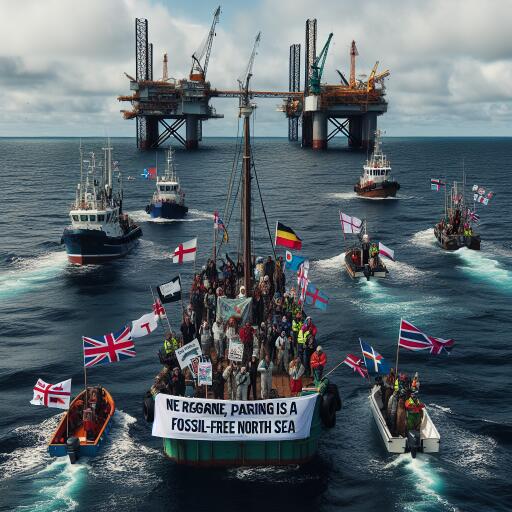
“Fossil-free North Sea”: Activists in 6 countries protest “unbalanced” oil and gas development
In a unified call for climate action, environmentalists across six nations bordering the North Sea took to the streets in a series of protests aimed at challenging their governments’ ongoing fossil fuel projects. The coordinated demonstrations, held in the United Kingdom, Norway, Sweden, Denmark, Germany, and the Netherlands, were part of the ambitious Fossil Free North Sea campaign. This initiative seeks to align North Sea oil and gas development plans with the ambitious goals of the Paris Agreement, particularly its target to limit global warming to 1.5°C above pre-industrial levels.
Activists deployed a mix of tactics including roadblocks, the occupation of ports and oil refineries, the unfurling of banners, and the holding of solidarity events. These actions underscored a deep dissatisfaction with current policies, highlighting the urgent need for a shift towards sustainable energy systems.
A spokesperson from the environmental group Extinction Rebellion highlighted the collective ignorance of North Sea nations towards the environmental impact of their oil drilling activities. “For too long,” they stated, “these countries have turned a blind eye to the emissions resulting from their oil exploration, directly contradicting global efforts to mitigate climate change.” The activists argue that a relentless pursuit of new oil and gas ventures in the North Sea will only hasten the arrival of the most severe climate change scenarios.
The protests were galvanized by a recent report from Oil Change International, which criticized the lack of cohesive strategies among North Sea countries regarding the transition to renewable energy and the adherence to the 1.5°C warming limit set by the United Nations. Alarmingly, if considered as a single entity, these countries would rank as the world’s seventh-largest oil and gas producers. Furthermore, the report points out the ongoing issuance of new fossil fuel exploration and development permits, flying in the face of the International Energy Agency’s warnings against any new fossil fuel projects if global temperature rise is to be limited as agreed upon.
In particular, the United Kingdom and Norway were identified as potentially becoming among the top 20 global oil and gas developers by mid-century without significant policy shifts. This revelation has raised concerns about both countries’ commitments to global climate leadership and the potential for creating sustainable communities through green industry advancements.
Clare Farrell, a co-founder of Extinction Rebellion, criticized North Sea governments for their “betrayal” of global climate commitments, especially in the wake of record-breaking temperatures. “Our governments seem to prioritize outdated economic interests over the well-being of their citizens and the global community,” Farrell remarked. She emphasized that the protests served as a vital platform for citizens to voice their opposition to such policies.
The demonstrators’ demands were clear: an immediate halt to new oil and gas infrastructure projects in the North Sea, honest communication from governments about the severity of the climate crisis, and a fair transition to renewable energy sources. Many activists also voiced additional concerns specific to their country’s stance on environmental issues.
As governments juggle economic growth, energy security, and environmental protection, the actions and voices of these activists underscore the growing demand for a decisive move away from fossil fuels. The Fossil Free North Sea campaign brings to light the pressing need for international cooperation and bold policy changes to safeguard our planet for future generations.





Leave a Reply